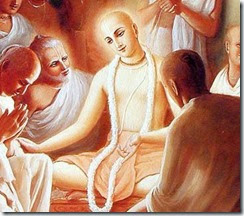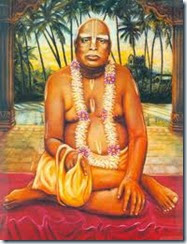Wednesday, July 15, 2015
Krishna is Acyuta
Friday, February 20, 2015
Opposing Irrationalism
Bhagavad Gita As It Is
Chapter 16. The Divine And Demoniac Natures
TEXT 7
Those who are demoniac do not know what is to be done and what is not to be done. Neither cleanliness nor proper behavior nor truth is found in them.
In early February, 2015 Islamic State released a 22 minute video depicting the burning of a captured soldier.
Jordanian and U.S. officials promised swift action to the execution of First Lt. Muath al-Kasasbeh.
This clearly does not conform to Islam. The development of Islamic Antinomianism is developed where jihadhi adherents rule ex cathedra.
To another example: In September, Sheikh Abu Muhammad al-Adnani, the Islamic State’s chief spokesman, called on Muslims in Western countries such as France and Canada to find an infidel and “smash his head with a rock,” poison him, run him over with a car, or “destroy his crops.”
In reality the United States has been attacking it’s own citizens with Chemical Assault Scorched Earth openly since June 17, 1987.
I know this first hand since the attack is imposed over only one person myself Bhakta David Nollmeyer.
Blythe Hay Bales
Blythe Colorado River Canal
The hay supra will burn you hand to the touch. The Colorado River is contaminated from Blythe, California running towards Mexico.
This action is the result of a Gay Militia operating form LAPD. The allegation is that Cambridge Law School are the Origin or proximate cause. It appears also that Islamic State fighters themselves are recruited with this Gay Militia.
In Texas yesterday Gay Marriage was halted in Travis County after one ceremony.
This alter ego confrontation will damage civilization further.
Tuesday, August 12, 2014
How to Discharge Devotional Service

NoD 6-1970: How to Discharge Devotional Service
Chapter Six
How to Discharge Devotional Service
Çréla Rüpa Gosvämé states that his elder brother (Sanätana Gosvämé) has compiled Hari-bhakti-viläsa for the guidance of the Vaiñëavas and therein has mentioned many rules and regulations to be followed by the Vaiñëavas. Some of them are very important and prominent, and he will now mention these very important items for our benefit. The purport of this statement is that Çréla Rüpa Gosvämé proposes to mention only basic principles, not details. For example, a basic principle is that one has to accept a spiritual master. Exactly how one follows the instructions of his spiritual master is considered a detail. For example, if one is following the instruction of his spiritual master and that instruction is different from the instructions of another spiritual master, this is called detailed information. But the basic principle of acceptance of a spiritual master is good everywhere, although the details may be different. Çréla Rüpa Gosvämé does not wish to enter into details here, but wants to place before us only the principles.
He mentions the basic principles as follows: 1) accepting the shelter of the lotus feet of a bona fide spiritual master, 2) becoming initiated by the spiritual master and learning how to discharge devotional service from him, 3) obeying the orders of the spiritual master with faith and devotion, 4) following in the footsteps of great äcäryas (teachers) under the direction of the spiritual master, 5) inquiring from the spiritual master how to advance in Kåñëa consciousness, 6) being prepared to give up anything material for the satisfaction of the Supreme Personality of Godhead, Çré Kåñëa (This means that when we are engaged in the devotional service of Kåñëa, we must be prepared to give up something which we may not like to give up, and also we have to accept something which we may not like to accept.), 7) residing in a sacred place of pilgrimage like Dvärakä or Våndävana, 8) dealing with the material world only as far as necessary, 9) observing the fasting day on Ekädaçé, and 10) worshiping sacred trees like the banyan tree.
These ten items are preliminary necessities for beginning the discharge of devotional service in regulative principles. In the beginning, if a neophyte devotee observes the above-mentioned ten principles, surely he will quickly make good advancement in Kåñëa consciousness.
Sunday, April 20, 2014
Transition States
Srila Prabhupada
Chapter 15. The Yoga of the Supreme Person
Chapter 15, Verse 1.
The Blessed Lord said: There is a banyan tree which has its roots upward and its branches down and whose leaves are the Vedic hymns. One who knows this tree is the knower of the Vedas.
Chapter 15, Verse 2.
The branches of this tree extend downward and upward, nourished by the three modes of material nature. The twigs are the objects of the senses. This tree also has roots going down, and these are bound to the fruitive actions of human society.
Chapter 15, Verse 3-4.
The real form of this tree cannot be perceived in this world. No one can understand where it ends, where it begins, or where its foundation is. But with determination one must cut down this tree with the weapon of detachment. So doing, one must seek that place from which, having once gone, one never returns, and there surrender to that Supreme Personality of Godhead from whom everything has began and in whom everything is abiding since time immemorial.
In Social Systems Theory bifurcation means branching. In the Vedas the term anga means branch. This process is also called a phase transformation.
According to Butz (1997), “ A system moves from a previous order to a new and more complex order by virtue of a chaotic transitory period.”
According to Prigogine and Stengers (1984), this fluctuation or singular moment or bifurcation is inherently impossible to predict as to whether the transition will be towards higher states of order or disintegrate into chaos.
Hence, the system may be reacting to external, internal, vertical, and horizontal pressures as it attempts to survive.
Transitions are weak links in a system whether it is an organism or level of human organization.
One can observe that a baby calf or deer may have only seconds or minutes to get it’s legs after birth to avoid the wild predators that are only meters away.
Gaudiya Vaishnavism has a very long lineage. It has been nearly extinct several times as previously to the time when Krishna spoke the Bhagavad Gita to Arjuna.
There has been many angas or branches since Bhaktivinoda revived Gaudiya Vaishnavism just over 100 years past.
One may observe the different camps diksa – ritvik, and mathas as the Caitanya Nsringha and IPBSYS or Pure Bhakti.
There are several lines operating under what is diksa ISKCON currently.
Monday, March 24, 2014
SRI SANMODANA BHASYAM
Bhaktivinoda Thakura
Excerpts
The word bhava indicates the jiva's forcible subjection to
repeated births in this world. Bhava is a continuous cycle of
birth and death called mahadavagni (blazing fire), a raging
conflagration that cannot be extinguished by any means other than the congregational chanting of Krsna's holy name.
A question may arise at this point: when one is at last
enlightened about his svadharma or eternal function as a liberated
soul, does he then cease chanting Krsna's holy name? The
answer is no; the stoppage of chanting never occurs, because
chanting God's name is verily the soul's sva-dharma. The phrase
sreyah-kairava-candrika-vitarana confirms this by specifically
conveying the sense of the eternal activity of the spirit soul in
his original spiritual condition.
Jivas who are enslaved by maya prefer to enjoy material
life, and this desire perpetuates their bondage to the cycle of
birth and death. This the root cause of the threefold miseries.
But when the spirit soul becomes disgusted with material
enjoyment and re-dedicates his time and energy to Lord Krsna's
loving service, he reaps the greatest benefit. This benefit is
compared to a the cluster of pristine white lotuses, for just as
the moon's soothing rays cause the white lotuses to blossom, the
rasaladen rays of the chanting of the holy name stirs the enfolded
petals of the lotus of the jiva's good fortune, causing it
to open.
As it is said, "devotion gives birth to devotion": the
sincere and faithful devotee must therefore follow the principles
of elementary bhakti by regularly hearing and chanting the holy
name until the first light of pure devotion begins to dawn in the
heart. The closed lotus flower touched by the moon's rays
awakens in full bloom, and similarly, when the congregational
chanting of the holy name spreads the rays of bhava (the essence
of hladini) and impregnates the soul's heart, rati (conjugal love
for Sri Krsna) then lights up his consciousness, bestowing the
highest benediction. This is what is meant by the "rays of the
benediction moon."
Sunday, March 16, 2014
Sri Gauranga Pranama
Çré Gauräìga Praëäma
namo mahä-vadänyäya kåñëa-prema-pradäya te
kåñëäya kåñëa-caitanya-nämne gaura-tviñe namaù
SYNONYMS
namaù—obeisances; mahä-vadänyäya—who is most munificent and charitably disposed; kåñëa-prema—love of Kåñëa; pradäya—who can give; te—unto You; kåñëäya—the original Personality of Godhead; kåñëa-caitanya-nämne—under the name Kåñëa Caitanya; gaura-tviñe— whose complexion is the golden complexion of Çrématé Rädhäräëé;
namaù—obeisances.
TRANSLATION
O most munificent incarnation! You are Kåñëa Himself appearing as Çré Kåñëa Caitanya Mahäprabhu. You have assumed the golden color of Çrématé Rädhäräëé, and You are widely distributing pure love of Kåñëa. We offer our respectful obeisances unto You.
Tuesday, March 11, 2014
Bhagavad Gita Ch. 13: 8-12
Srila Prabhupada
Therefore our duty is, mahājano yena gataḥ sa panthāḥ [Cc. Madhya 17.186]. "We have to accept that way which is given by the mahājana." Mahājana. So śāstra... We are sometimes in difficulty to find out the mahājana, who is mahājana. That mahājana is also described in the śāstras, who can be accepted the greatest authority, mahājana. That is stated in the Sixth Canto of Śrīmad-Bhāgavatam. Svayaṁbhur nāradaḥ śaṁbhuḥ [SB 6.3.20]. They are mahājanas. Svayambhuḥ means Brahmā. Brahmā is mahājana. Svayambhu, Nārada. Nārada Muni is mahājana. And Śambhu, Lord Śiva, he is also mahājana. Svayaṁbhur nāradaḥ śaṁbhuḥ kumāraḥ [SB 6.3.20], four Kumāras. Sanat-kumārādi, they are also mahājanas. Kapila, Kapiladeva who expounded that Sāṅkhya philosophy, Kapiladeva. He is incarnation of God. Kumāraḥ kapilo manuḥ.
Svayambhuva Manu, he is also authority. Manu's name is also mentioned in the Bhagavad-gītā. Imaṁ vivasvate yogaṁ proktavān aham avyayaṁ vivasvān manave prāhuḥ [Bg. 4.1]. So therefore Manu is also mahājana, he's authority. There is Manu-saṁhitā. Our Vedic system is conducted, the law, the law-giver is Manu. From Manu, the manuṣya, "man", these words have come, Manu. Descendant of Manu, human society, manuṣya.
So Prahlāda, Prahlāda Mahārāja is mahājana. Janaka, Janaka Mahārāja. Prahlādo janako bhīṣmaḥ, Bhīṣmadeva, grandfather Bhīṣmadeva, the grandfather of the Pāṇḍus. He is also mahājana. Prahlādo janako bhīṣmo baliḥ, Bali Mahārāja, he is mahājana. Vaiyāsakiḥ, Śukadeva Gosvāmī, and Yamarāja, he is also mahājana.
So we have to follow the footsteps of the mahājana. Otherwise we shall be bewildered. Kṛṣṇa therefore, He says, ṛṣibhir bahudhā gītam: "There are many saintly persons, great sages, and they have spoken in various ways." But Kṛṣṇa concludes, the Vedānta-sūtra. Vedānta-sūtra, He gives reference because this Vedānta-sūtra comes from the disciplic succession of Brahma. Brahma-sūtra. Lord Brahma, Kṛṣṇa instructed Brahma. Tene brahma hrdā ādi-kavaye [SB 1.1.1]. Ādi-kavi is Brahmā, and Kṛṣṇa instructed him. Tene brahma... Brahmā means Vedas. Śabda-brahma. The śabda-brahma was instructed to Lord Brahmā by Kṛṣṇa. Therefore Kṛṣṇa is the original guru.
Therefore Kṛṣṇa says in the Bhagavad-gītā, imaṁ vivasvate yogam proktavān aham: [Bg. 4.1] "This yoga system, Bhagavad-gītā yoga system, I first of all spoke to the sun-god." Vivasvān manave prāhuḥ. And the sun-god, whose name is Vivasvān, he spoke to his son Manu. Manur ikṣvākave 'bravīt. And Manu spoke to his son, Mahārāja Ikṣvāku. Mahārāja Ikṣvāku is coming from the dynasty of the sun-god Vivasvān. There are two kṣatriya families, one from the moon god, another, the sun-god. So Mahārāja Rāmacandra appeared in the family of the sūrya-vaṁśa, Ikṣvāku, Mahārāja Ikṣvāku.
So this is the paramparā system. And everything is described in the Brahma-sūtra by Vyāsadeva. Vyāsadeva happens to be the disciple of Nārada. Nārada happens to be disciple of Brahma. And from Vyāsadeva, Madhvācārya; then from Madhvācārya disciplic succession, Mādhavendra Purī. Mādhavendra Purī was the spiritual master of Īśvara Purī. Īśvara Purī was the spiritual master of Caitanya Mahāprabhu. Caitanya Mahāprabhu is the spiritual master of the Six Gosvāmīs of Vṛndāvana: rūpa sanātana bhaṭṭa raghunāth, śrī jīva gopāla bhaṭṭa dāsa raghunāth. So from the Gosvāmīs, then Kavirāja Gosvāmī, Viśvanāth Cakravārtī Ṭhākura, then Jagannāth dās Bābājī, then Bhaktivinoda Ṭhākura, Gaura-Kiśora dāsa Bābājī, Bhaktisiddhānta Sārasvatī. And we are servant of Bhaktisiddhānta. So there is a disciplic succession.
That paramparā should be followed. Evaṁ paramparā-prāptam imaṁ rājarṣayo viduḥ [Bg. 4.2]. If we want to understand really Vedic literature, then we must follow the paramparā system. There are four sampradāyas, paramparā: the Rāmanuja Sampradāya, Madhvācārya Sampradāya, Viṣṇu Svāmī Sampradāya, Nimbārka Sampradāya. So we belong to the Madhvācārya Sampradāya. Fortunately, all these ācāryas, even Śaṅkarācārya, they appeared from South India. This sampradāya, ācārya-sampradāya, is going on all over India. So every sampradāya has got his commentary on the Brahma-sūtra. Therefore Kṛṣṇa says here, brahma sūtra-padaiś caiva hetumadbhir viniścitaiḥ [Bg. 13.5]. Unless a sampradāya, the four sampradāyas, they do not comment on the Brahma-sūtra, he'll not..., that sampradāya is not accepted. And if you do not accept the sampradāya..., sampradāya-vihīnā ye mantrās te niṣphalā matāḥ.
If you do not take your initiation mantra from the sampradāya, then it is useless. Now, there are so many apasampradāya. They do not come in disciplic succession, but becomes guru, teacher. Therefore everything is topsy-turvied. Nobody has got fixed idea what is God. Everyone has created his own philosophy. The whole thing is now confused.
http://prabhupadabooks.com/classes/bg/13/8-12/bombay/september/30/1973









